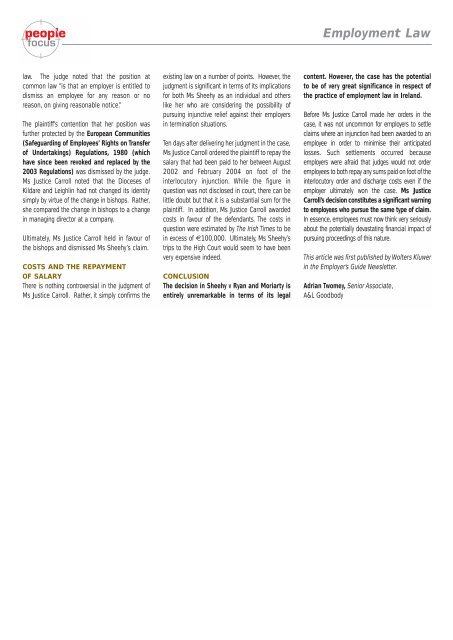People Focus Spring 04 NA - CIPD
People Focus Spring 04 NA - CIPD
People Focus Spring 04 NA - CIPD
- No tags were found...
Create successful ePaper yourself
Turn your PDF publications into a flip-book with our unique Google optimized e-Paper software.
Employment Lawlaw. The judge noted that the position atcommon law “is that an employer is entitled todismiss an employee for any reason or noreason, on giving reasonable notice.”The plaintiff’s contention that her position wasfurther protected by the European Communities(Safeguarding of Employees’ Rights on Transferof Undertakings) Regulations, 1980 (whichhave since been revoked and replaced by the2003 Regulations) was dismissed by the judge.Ms Justice Carroll noted that the Dioceses ofKildare and Leighlin had not changed its identitysimply by virtue of the change in bishops. Rather,she compared the change in bishops to a changein managing director at a company.Ultimately, Ms Justice Carroll held in favour ofthe bishops and dismissed Ms Sheehy’s claim.COSTS AND THE REPAYMENTOF SALARYThere is nothing controversial in the judgment ofMs Justice Carroll. Rather, it simply confirms theexisting law on a number of points. However, thejudgment is significant in terms of its implicationsfor both Ms Sheehy as an individual and otherslike her who are considering the possibility ofpursuing injunctive relief against their employersin termination situations.Ten days after delivering her judgment in the case,Ms Justice Carroll ordered the plaintiff to repay thesalary that had been paid to her between August2002 and February 20<strong>04</strong> on foot of theinterlocutory injunction. While the figure inquestion was not disclosed in court, there can belittle doubt but that it is a substantial sum for theplaintiff. In addition, Ms Justice Carroll awardedcosts in favour of the defendants. The costs inquestion were estimated by The Irish Times to bein excess of €100,000. Ultimately, Ms Sheehy’strips to the High Court would seem to have beenvery expensive indeed.CONCLUSIONThe decision in Sheehy v Ryan and Moriarty isentirely unremarkable in terms of its legalcontent. However, the case has the potentialto be of very great significance in respect ofthe practice of employment law in Ireland.Before Ms Justice Carroll made her orders in thecase, it was not uncommon for employers to settleclaims where an injunction had been awarded to anemployee in order to minimise their anticipatedlosses. Such settlements occurred becauseemployers were afraid that judges would not orderemployees to both repay any sums paid on foot of theinterlocutory order and discharge costs even if theemployer ultimately won the case. Ms JusticeCarroll’s decision constitutes a significant warningto employees who pursue the same type of claim.In essence, employees must now think very seriouslyabout the potentially devastating financial impact ofpursuing proceedings of this nature.This article was first published by Wolters Kluwerin the Employer’s Guide Newsletter.Adrian Twomey, Senior Associate,A&L Goodbody
















